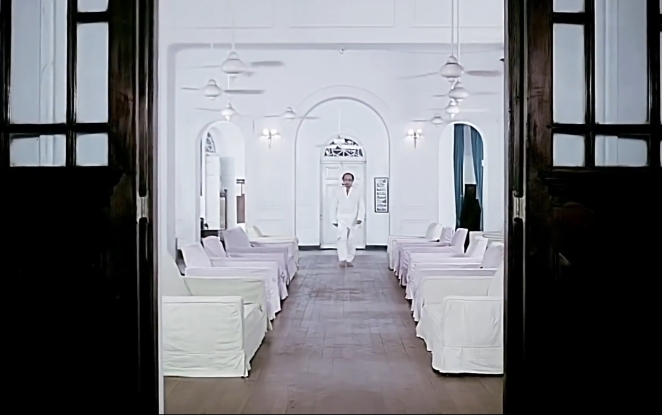
This semi-comical snapshot of the middle class Bengali experience in Kolkata is apparently a minor work in Sen’s oeuvre. The story is slight; a young Bengali man Dipu (Anjan Dutta) aspires to be a journalist and as a sort of test of creativity, the editor of a newspaper (Utpal Dutta) asks Dipu to write a story based on his own middle class experiences. The story of Dipu trying to write is merely a pretext for Sen to remain connected with the urban landscape of Kolkata, a return to the richness of the city spaces, last probed with such pleasure since his Kolkata Trilogy. The socio-political urgency of Sen’s cinema after the aesthetic and thematic experiments of The Kolkata Trilogy never really went away from his work – he remained just as connected with the social milieu of the city. For instance, the uninhibited camera roaming freely through the fish market recalls Interview (70) when Ranjit meets his uncle, the first of many self-referential instances. Later, when Dipu tries to flag down a taxi in the bustling streets of Kolkata, Sen adopts an erratic editing style, articulating a blinding disorientation reminiscent of the street cinema of The Kolkata Trilogy, in which characters are liberated and imprisoned by the city in a scarring psychological duality.



There is probably a consensus that Sen made two trilogies. The Kolkata Trilogy (1970 – 1973; Interview, Calcutta 71 and Padatik – although you could probably argue for Chorus too, which was released in 1974), and The Absence Trilogy (Ek Din Pratidin/And Quite Rolls The Dawn – 1979, Kharij/The Case Is Closed – 1982 and Ek Din Achanak/Suddenly, One Day – 1989). I would argue Chalchitra is part of another trilogy, although much looser, but nonetheless important, which also includes Akaler Shandhaney/In Search of Famine (1980) and Khandahar/The Ruins (1983). The abiding theme in this trilogy is concerned with the media apparatus (film crew, photographer, journalist) and the role of the middle class in terms of mediating the politics of representation, exploitation and the gaze. In Chalchitra, Dipu’s urge to sensationalise the mundanity of the middle class experience constantly backfires on him because numerous opportunities for journalistic fodder are met with resistance from the people he encounters notably his mother (Geeta Dutt). It is only when a little boy poses the banal question: ‘How many ovens are there in Kolkata?’ does Dipu finally finds something to write about – pollution, smoke and coal. But this degree of obscurity points to something elemental about the middle class mentality and which results in Utpal Dutta enquiring if Dipu is a communist, a question first posed in Ray’s Pratidwandi (1970), and which seemingly never went away from the psyche of the older generation of Kolkata. Chalchitra features an elaborately staged but very comical dream sequence, clearly a manifestation of Dipu’s jumbled, anxious mind, and which features microcosmic imagery of smoke, women, the police and the press. There is a danger of dismissing Chalchitra as a minor, insubstantial work. However, once situated as part of a loose trilogy, the film takes on an added resonance and deserves a further look.
Leave a comment